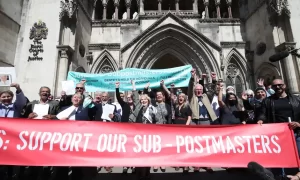Post Office Scandal compares to IR35 scandal

<?xml encoding=”utf-8″ ?????????>
In recent years, both the Post Office scandal and the IR35 scandal have sent shockwaves through the UK business and employment sectors. These high-profile cases have exposed the flawed practices of two important institutions, leading to widespread distrust and outrage.
The Post Office scandal which unfolded over a decade, involved the wrongful conviction of hundreds of subpostmasters for financial irregularities.
These subpostmasters were wrongly accused of theft and fraud due to issues with the Post Office’s Horizon computer system. The Horizon system was responsible for managing transactions and accounts at post office branches across the country. However, it was discovered that the system had numerous technical glitches and inaccuracies, leading to discrepancies in accounts that were often attributed to the subpostmasters’ wrongdoing.
This shocking revelation highlighted the devastating consequences of a faulty system and the improper handling of the situation by the Post Office. Many subpostmasters were wrongly prosecuted, resulting in ruined reputations, financial ruin, and even imprisonment. The scandal brought to light the lack of support and empathy from the Post Office towards its own employees, who were unfairly burdened with the blame for issues beyond their control.
Similarly, the IR35 scandal has raised concerns about the fair treatment of self-employed contractors. Originally introduced to tackle tax avoidance, IR35 legislation has been criticized for unfairly burdening contractors with tax responsibilities similar to those of employees, without receiving the corresponding employment benefits. Under IR35, contractors are subject to stricter tax rules if they are deemed to be working as “disguised employees” for their clients, rather than genuinely self-employed.
The controversy surrounding IR35 stems from the challenges faced by contractors who are forced to pay higher taxes, despite not enjoying the same protections and benefits as permanent employees. This has led to financial insecurity, reduced flexibility, and a lack of employment rights for contractors. Many argue that the legislation fails to acknowledge the fundamental differences between self-employed contractors and permanent employees, and that it unfairly punishes contractors for their choice of work arrangement.
Similarities between the Post Office Scandal and IR35 Scandal
While the Post Office scandal and the IR35 scandal may differ in their specifics, there are notable similarities between the two that cannot be ignored. Both scandals shed light on systemic flaws in large institutions and raise questions about accountability and fairness.
Firstly, both scandals involve institutions with significant power and influence. The Post Office is a trusted and long-established institution that plays a crucial role in the daily lives of millions of people. Similarly, IR35 legislation affects a large number of self-employed contractors, who often rely on it for their livelihoods. The impact of these scandals extends beyond the individuals directly affected, causing widespread concern and eroding trust in these institutions.
Secondly, both scandals expose the damaging consequences of flawed systems and processes. In the case of the Post Office scandal, the Horizon computer system was found to be deeply flawed, leading to wrongful convictions and unjust treatment of subpostmasters. Similarly, the IR35 legislation has been criticized for its lack of clarity and its failure to properly distinguish between self-employed contractors and employees. These flawed systems have resulted in significant hardships for individuals and raised serious questions about the fairness and effectiveness of the institutions involved.
Finally, both scandals have sparked public outrage and demands for accountability. The wrongful convictions of subpostmasters prompted widespread public sympathy and support, with calls for justice and compensation. Similarly, the IR35 scandal has led to protests and campaigns from contractors who feel unfairly targeted and burdened by the legislation. In both cases, affected individuals and their supporters have pushed for transparency, accountability, and changes to prevent similar injustices from occurring in the future.
Dave Chaplin, CEO of IR35 compliance firm IR35 Shield and prolific campaigner on IR35 said: “LBC’s Shelagh Fogarty was right to draw parallels between the Post Office scandal and IR35 on her show earlier this week. Watching the ITV docudrama was like playing a game of snap with the Post Office and Mr Bates in one corner and HMRC and me in the other. Let’s look at the similarities:
“Individuals were told that if they appealed to the court and won then HMRC would appeal. Snap. And the record shows that’s exactly what HMRC has done.
“Individuals were told they owe the government money without a full and thorough examination of the facts. Snap.
“The state using unlimited legal firepower against individuals. HMRC has used expensive barristers and solicitors in tax tribunals for years. Snap.
“The state misinforming ministers on facts. Snap. HMRC’s head, Jim Harra, recently relayed tribunal statistics to the Public Accounts Committee which were objectively wrong.
“Individuals giving up the fight and paying up despite their innocence. Snap. Taxpayers have been paying HMRC because they cannot afford tax tribunals and fear doing so.
“Ministers responding to letters from MPs on behalf of concerned constituents. Snap. Letters from successive Treasury Ministers, including the Chancellor simply signing responses drafted by HMRC without due scrutiny.
“In the case of the Post Office victims, I am pleased to hear that the government is considering quashing all the victims’ cases en masse. When it comes to IR35, it is imperative that we see better treatment for UK taxpayers, which is why I have launched the Taxpayer Fairness campaign to address the evidence that tax authorities undermine the rule of law, leading to taxpayers becoming victims of taxing authorities’ abuse.
“The basis of reform must ensure the tax authorities maintain strong powers to enforce and administer the tax law of their country, but be subject to stronger oversight, transparency, and accountability, with checks and balances aligned with the rule of law.
“That is only fair.”
Impact on affected individuals and businesses
The impact of these scandals on affected individuals and businesses cannot be overstated. In the case of the Post Office scandal, subpostmasters faced financial ruin, reputational damage, and emotional distress. Many lost their livelihoods and were left struggling to rebuild their lives after being wrongly accused of theft and fraud. The toll on their mental health and personal relationships cannot be underestimated.
Similarly, the impact of the IR35 scandal on self-employed contractors has been significant. Many contractors have found themselves facing higher tax bills, reduced income, and a lack of employment rights and benefits. This has led to financial instability, increased stress, and a loss of trust in the institutions that govern their working lives. The uncertainty and unfair treatment faced by contractors have also had a wider impact on businesses, as many contractors have been forced to leave the industry or seek work abroad, leading to a loss of valuable skills and expertise.
Legal actions and inquiries related to the scandals
In response to the Post Office scandal, a group litigation was launched by the subpostmasters who were wrongfully accused. This legal action sought justice, compensation, and accountability from the Post Office for the devastating impact they experienced. The litigation exposed further evidence of the systemic failures within the Post Office and highlighted the need for a thorough investigation into the handling of the scandal.
Similarly, the IR35 scandal has prompted legal challenges and inquiries. Contractors and industry bodies have called for a review of the legislation and its impact on self-employed workers. The government has responded with consultations and inquiries into the effectiveness and fairness of IR35, with the aim of addressing the concerns raised by contractors and ensuring a more balanced approach to taxation and employment rights.
Media coverage and public awareness
Both scandals have received significant media coverage, which has played a crucial role in raising public awareness and exposing the systemic issues at hand. The media has reported on the injustices faced by subpostmasters and contractors, helping to bring their stories to the forefront and generate public sympathy and support. This coverage has not only led to increased scrutiny of the institutions involved but has also sparked wider discussions about the rights and protections of workers in the UK.
Lessons learned and changes implemented
The scandals have highlighted the urgent need for change and reform within the Post Office and the IR35 legislation. Lessons can be learned from the mishandling of the Post Office scandal, particularly in terms of the need for transparency, accountability, and proper oversight of systems and processes. The Post Office has since acknowledged its failures and committed to implementing changes to prevent similar injustices from occurring in the future.
Similarly, the IR35 scandal has exposed the flaws in the legislation and the need for a more considered and fair approach to taxing self-employed contractors. The government has recognized the concerns raised by contractors and has committed to reviewing and improving the legislation to address these issues. This has included consultations with industry stakeholders and experts to ensure a more equitable and supportive system for contractors.
Throughout both scandals, there have been widespread calls for accountability and compensation for those affected. Subpostmasters who were wrongfully convicted in the Post Office scandal have sought justice and financial redress for the hardships they endured. Similarly, contractors affected by the IR35 legislation have demanded fairer treatment, compensation for financial losses, and the recognition of their employment status.
These calls for accountability and compensation are not only important for the individuals directly affected but also for the restoration of trust and confidence in these institutions. The ability to address past wrongs and provide restitution is a crucial step in rebuilding relationships and ensuring that similar injustices do not occur in the future.
The Post Office scandal and the IR35 scandal have exposed significant flaws within two important institutions in the UK. The wrongful convictions of subpostmasters and the unfair treatment of self-employed contractors have raised serious questions about accountability, fairness, and the protection of individuals’ rights.
It is essential that these scandals are not forgotten or brushed aside. The impact on affected individuals and businesses cannot be underestimated, and the need for transparency, accountability, and reform is clear. Lessons must be learned, changes must be implemented, and those responsible must be held to account.
By addressing the systemic issues highlighted by these scandals, we can work towards a fairer and more equitable working environment for all. This includes protecting the rights of individuals, ensuring proper oversight and accountability within institutions, and fostering a culture of trust and fairness. Only then can we restore confidence in the systems that govern our working lives and prevent similar injustices from occurring in the future.




